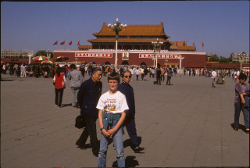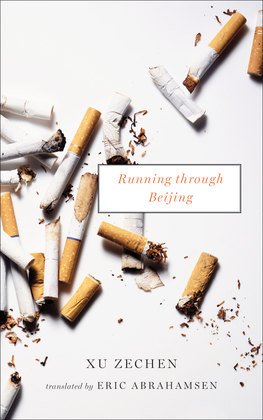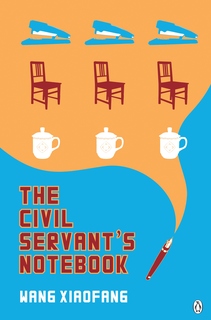Posts
By Eric Abrahamsen, December 24, '08
This morning was the press conference for the Dangdai literary magazine's fifth annual best novel award. Dangdai, which is run by the People's Literature Publishing House, is trying to turn this prize into a bit of a challenge to the hegemony of the bigger prizes administered by the Writers Association: the editor of Dangdai, Yang Xinlan, specifically touted this prize as the non-governmental answer to the Mao Dun prize.
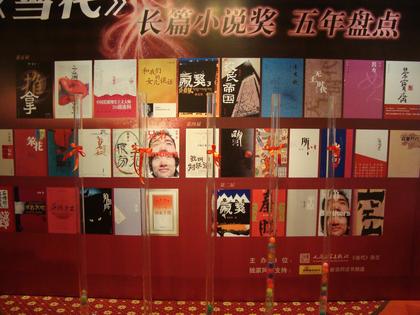
Every literary prize and its brother is touting "transparency" and "fairness" these days, but the Dangdai prize might get a little closer to that goal than most: there is no cash for the winner, reducing some of the incentive for backdoor dealing, and to hear Yang talk, the judges were left unmolested during the nomination process. She even described them as being slightly taken aback when the magazine had no "directives" or even gentle hints as to which direction they should cast their votes — if this is true, it speaks as well for the Dangdai prize as it does poorly for the other prizes.
More…
By Eric Abrahamsen, December 23, '08
According to Yu Hua, a professor of Chinese once ran his book 许三观卖血记 (translated as Chronicle of a Blood Merchant) through the data cruncher, and calculated the number of different characters Yu Hua had used in writing the book. The grand total was 486. Is that even possible?
Update: I asked Yu Hua for more details, he went digging, and it turns out this was quite wrong. The actual numbers are 1,909 characters for Chronicle of a Blood Merchant, and 1,907 characters in To Live. Far more than 486 characters; still far, far less than you'd expect for two of the more influential novels of the past couple decades.
By Eric Abrahamsen, December 11, '08
You readers and lovers of Chinese novels, may we ask your assistance? We're putting together a few lists of books which have not yet been translated into English, but ought to be: from the inexplicably passed-over classics of modern Chinese literature to last year's sleeper hit. What gold has yet to be claimed, either deep-buried, or lying on the sidewalk where anyone could pick it up? We're also counting books that have been translated, but translated poorly, so yes – Fortress Besieged counts.
If you're a translator sitting on the book proposal that's going to make your career, we can sympathize if you keep mum, but we hope the rest of you will cut loose.
I'll start: Jia Pingwa's 废都 (Abandoned Capital). Why the hell is this not in English yet?
By Eric Abrahamsen, December 1, '08
Feng Tang is talking at the One Way Street Bookstore this Sunday (Dec 7) from 3pm to 5pm, details here.
By Eric Abrahamsen, November 30, '08
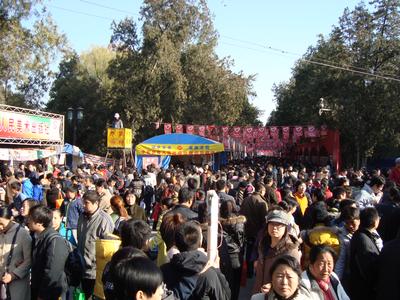
I think there were some books there, but it was pretty hard to tell.
By Eric Abrahamsen, November 27, '08
The newest edition of the Frankfurt Book Fair newsletter is out (via Three Percent), and includes an interview with Jing Bartz, director of the Frankfurt Book Fair's Beijing Book Information Centre. The most eye-catching of the topics discussed was this:
The minister from the General Administration of Press and Publication (GAPP) approved the first list of translation funding shortly before the Frankfurt Book Fair. The amounts range from 2,000 to 7,000 euros per title.
Before anyone gets excited, the deadline for applying for GAPP funding was November 15, and funds were only applicable to books going into German. The interview touches on several other topics of interest (including the privatization of China's publishing houses) so do take a look…
By Eric Abrahamsen, November 10, '08
Howard Goldblatt has graciously allowed us to publish this essay of his on the openings of Chinese novels.
In the Beginning
"Every summer Lin Kong returned to Goose Village to divorce his wife."
How could anyone not want to keep reading, at least for a while, with an opening line like that?
Or:
"I was born twice: first, as a baby girl, and then again, as a teenage boy."
Or, finally:
"'Sons of bitches.' Lituma felt the vomit rising in his throat. 'Kid, they really did a job on you.'"
From Melville to Tolstoy and beyond, all the way to Ha Jin, Jeffrey Eugenides, and Mario Vargas Llosa, novelists in the West have assumed that, like a flashy cover, an arresting opening line can go a long way toward starting those pages turning.
When he wrote…
"Lolita, light of my life, fire of my loins. My sin, my soul. Lo-lee-ta: the tip of the tongue taking a trip of three steps down the palate to tap, at three, on the teeth. Lo. Lee. Ta."
…Nabakov knew he'd get our attention.
We don't, however, see many opening sentences of that nature in novels written in Chinese. After more than thirty years of translating Chinese novels into English, I cannot readily call to mind any I've worked on that provide a riveting, provocative, even outlandish opening. That's not to say they don't exist, or that the rules aren't changing, as cultural globalization gains momentum; it's just that a different, and equally valid, narrative strategy, a more tradition-bound beginning has been the norm in recent decades. I've often wondered what that says about the contemporary Chinese novel. Beyond that, how do expectations and standards of enjoyment or acceptance between Chinese and Western readers of fiction differ?
More…
By Eric Abrahamsen, November 3, '08
The Olympics Games and multiple national disasters aside, 2008 is an historic year for another reason: it marks the 30th anniversary of the end of the Cultural Revolution and the beginning of Deng Xiaoping's 'reform and opening up' (改革开放) economic recovery plan. Inevitably, this year has seen a pile of retrospectives and "where-are-we-now" type articles and TV programs, most illustrating just how far China has come in 30 years, while simultaneously reviving rhetoric and imagery from a more Socialist past.
The publishing world is no exception: this article (Chinese only) is an announcement of the impending publication of a series of the 300 "most influential books" of the past 30 years. Here's the second paragraph of the report:
According to the introduction provided by Nie Zhenning [聂震宁], president of the China Publishing Group [中国出版集团], the group has planned out 115 major themes and 16 major activities having to do with the 30 years of reform and opening up [henceforth "30RO"], and the publication and promotion of the "300 Most Influential Books of the 30RO" series, led by the China Book Business Report is one of the most important of those activities. "These 300 books provide a broad, deep, and true record of the magnificent surge of history over the 30RO. They are an earnest summary of the practical experience of 30RO. They explore 30 years of Sino-Marxist historical progress and fully reflect the deep changes that Chinese society and the Chinese people have gone through over the past 30 years under the leadership of the Chinese Communist Party. They proclaim the achievements of 30RO and the contributions which China has made to the development and progress of human society, thereby providing readers with rich resources regarding the history of the 30RO, and adding one more priceless jewel to the cultural treasure-stores of the Chinese nationality," said Nie Zhenning.
Update: The greater list is now online and you, citizen of the interwebs, have the chance to vote for your favorite authors! The 30-year criteria turns out to have meant, 'published within the past 30 years', which includes recent reprints of old books, which makes the criteria mostly meaningless. You can vote for as many books as you like, as many times as you like (we've voted four times so far), so get clicking! It's digital democracy; it only works if you believe!
The books will first be nominated by a committee of experts and the list will be publicized in the media. Readers will have a chance to vote on them, and then the experts will settle on the final 300. No mention is made of genre or type of book, but the books will: "provide healthy guidance to thought and morality, have positive, uplifting content, be conducive to the creation and promotion of advanced culture" etc etc etc.
On the one hand it's unfair to single this article out, as this kind of language is entirely obligatory and in some sense can be simply ignored. On the other hand, major publishing resources and publicity are being put into this series, resources that could have been spent elsewhere. And people wonder why Chinese literature can't quite pull itself together…
By Eric Abrahamsen, October 30, '08
It's time once again for the Mao Dun literary prize, so dear to the official heart of the Chinese literary scene. Never mind that everyone whose opinion we respect snorts in disdain at the very mention of this prize (which is administered by the Writers Association) it's still a literary event.
To get the suspense out of the way, there were four winners of this year's prize, which considered full-length works of fiction published between 2002 and 2006: Jia Pingwa's Qinqiang (秦腔, Qin Opera), generally considered the 'big winner', Chi Zijian's E'erguna He You'an (额尔古纳河右岸, The Right Bank of the Arguna River), Zhou Daxin's Huguang Shanse (湖光山色, Pastorale) and Mai Jia's Ansuan (暗算, Plotting).
The official announcement of the prize is awfully Marxist (for once the low-hanging fruit can stay right where it is), but there have been other, more thoughtful responses on-line.
More…
By Eric Abrahamsen, October 14, '08
After what has felt like a long, long month of translating crap, I snuck over to a non-work-related short story this evening and chewed on the first paragraph. It's called 玻璃酿 — which might conceivably mean 'Glass Fermentation', or could have a particular meaning I'm unaware of — and it's something Zhao Song at the Heilan website recommended to me; you can read the original here.
The first sentence is pretty standard short-story-ese, but it presents greater challenges to translation than simply locating a dictionary with the word "open-cut coal seam" in it, and that alone is cause for celebration:
午后三点的光线延长了松针的阴影。
Roughly: the light of three in the afternoon lengthens or draws out the shadows of the pine needles. There's a nice balance and rhythm to the sentence: split in half, with the second half turning on the verb 延长 (lengthen). There's a parallelism between 光线 (light) and 阴影 (shadow), each set at the end of their respective possessive phrases. The sentence as a whole has a nice clumping rhythm which I can only describe as trochaic sextameter (I looked that up): 'DUM-dum DUM-dum da-DUM-dum, DUM-dum da-DUM-dum da-DUM-dum'. Here are some candidates:
More…
By Eric Abrahamsen, October 8, '08
The following is a translation of this Chinese article, which appeared a few weeks ago, about Yan Lianke's newest novel Fengyasong (Elegy and Academe), a satire of academia and university life in China. The book drew heavy fire from some quarters, particularly professors at the universities to which the book alludes. The fictional 'Qingyan University' within the book is an amalgamation of China's two top universities: Qinghua and Peking Univeristy (the latter was once called Yanjing University).
The book that offended Peking University
"I think the critics at Peking University are being too sensitive." Yan Lianke's eyes are bloodshot, his face sallow, he looks exhausted.
No sooner had Yan Lianke's novel Elegy and Academe been published by the Jiangsu People's Publishing House than it elicited intense counterattack from the faculty and students of Peking University. Sharply-worded posts appeared on the internet one after the other: "I'm livid: Yan Lianke slanders Peking University in Elegy and Academe", "I've burnt Yan Lianke's Elegy and Academe!". Criticisms of the book by some Peking University critics were also published in newspapers; they felt that Yan Lianke had used fiction to "cast aspersions on Peking University, slander the humanist traditions of higher education, and to wantonly demonize intellectuals at institutes of higher education."
More…
By Eric Abrahamsen, October 2, '08
The Newman Prize for Chinese Literature is a new prize for Chinese writing sponsored by the University of Oklahoma's Institute for US-China Issues. Mo Yan has won the inaugural round, which you can read about here. From the home page:
The Newman Prize for Chinese Literature is awarded biennially in recognition of outstanding achievement in prose or poetry that best captures the human condition, and is conferred solely on the basis of literary merit. Any living author writing in Chinese (residing anywhere) is eligible. The Prize consists of $10,000 and a plaque, and may serve to crown a lifetime’s achievement or to direct attention to a developing body of work. An international jury of distinguished experts will both nominate the candidates and select the winner, based on a transparent voting process.
By Eric Abrahamsen, October 2, '08
The Xinhua News Agency, as it is wont to do, brings us fresh cause to despair: the hot new literay trend is here, and it is 'writing groups' or 'bands' (写作组合), cabals of scribblers analogous to the boy-bands or girl-bands that dominate the pop music world. These writing groups are mostly in the under-twenty age-range, mostly writing in imitation of 'older' celebrity writers like Han Han. Apparently it all started in 2006, when Li Ze (李锋) at the World Knowledge Press (世界知识出版社) published Water Town (水城), a novel by a pair of girls then aged 18 and 19, who called themselves Jumping Orange Writing. They were followed by the three members of Girls' Studio (女生作坊) (the youngest of whom is 16), Lollipop (棒棒糖) (middle school students), and Unknown Quantity (未知数) (elementary school students). As the article cheerfully notes, many of these groups only ever publish one book, or break up without having published anything at all.
Is this curtains for serious Chinese literature? I've done plenty of hand-wringing myself in the past few years, but at a certain point, when pop culture has got its claws deep enough into literature, it seems likely that literature will pull a Trojan Horse, and start to transform pop culture from the inside out. Among all these scribbling teens there must be a few who, fifteen years from now, at the age of 29 or 30, will start to feel the itch of dissatisfaction and wonder if they shouldn't be trying for something a little deeper. From the melodramatic, sentimental mush that's being produced today, it's only a few short steps to a Chinese Dickens, and once you've got a Chinese Dickens, well… there's nowhere you can't go.
Wishful thinking, perhaps, but if these trends keep up I'm going to renounce all snooty puritanism, and whole-heartedly embrace this new era of sloppy literary love. Not actually read the books, mind you, just 'embrace the era'.
By Eric Abrahamsen, September 26, '08
China will be the guest of honor at the 2009 Frankfurt Book Fair next year, and preparations are already underway. The following conversation serves as a foreword to the informational packet being produced by the German Book Information Centre here in Beijing, which also includes a sampling of Chinese writers and works that will be featured at the Frankfurt Book Fair.
More…
By Eric Abrahamsen, September 21, '08
The following article ran in Southern Weekend in late August, examining The New York Times Book Review's edition dedicated to reviews of Chinese literature. In the interest of multicultural understanding, we hereby present this translation of an analysis of a review of a translation of some novels.
Does everyone remember the domestic media reports in early May, saying that The New York Times Book Review had praised Guo Jingming as China's 'most successful' writer? Plenty of people had their feelings hurt and, hopping mad, cursed the American devils for wearing colored glasses and slandering Chinese literature.
More…


